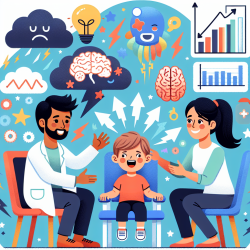Introduction
As practitioners in the field of speech-language pathology, understanding the impact of emotions on decision-making can significantly enhance our ability to deliver effective online therapy services. The research article "The Role of Emotion in Global Warming Policy Support and Opposition" by Smith and Leiserowitz (2013) provides valuable insights into how discrete emotions influence public support for policies. These findings can be translated into actionable strategies for improving therapy outcomes for children in schools.
The Role of Emotions in Decision-Making
The study highlights that emotions such as worry, interest, and hope are strong predictors of policy support. These emotions can be leveraged to foster engagement and motivation in children receiving online therapy. Understanding and addressing the emotional states of children can lead to more personalized and effective interventions.
Implementing Emotional Insights in Online Therapy
- Worry: Recognize that worry can drive engagement. For children who express concerns about their progress or therapy, use this emotion as a catalyst to encourage active participation and goal setting.
- Interest: Cultivate curiosity and interest by incorporating interactive and engaging activities in therapy sessions. Tailor content to align with the child's interests to enhance motivation and learning.
- Hope: Foster a hopeful outlook by setting achievable goals and celebrating small successes. Reinforce the belief that progress is possible, which can enhance the child's commitment to therapy.
Encouraging Further Research
Practitioners are encouraged to explore further research on the role of emotions in therapy settings. Understanding the emotional dynamics of children can lead to more effective interventions and improved outcomes. Consider collaborating with researchers to study the impact of emotional engagement in online therapy.
Conclusion
By integrating the insights from the research on emotions and policy support, practitioners can enhance the effectiveness of online therapy services for children. Emphasizing emotional engagement can lead to better therapy outcomes and foster a supportive learning environment.
To read the original research paper, please follow this link: The Role of Emotion in Global Warming Policy Support and Opposition.










